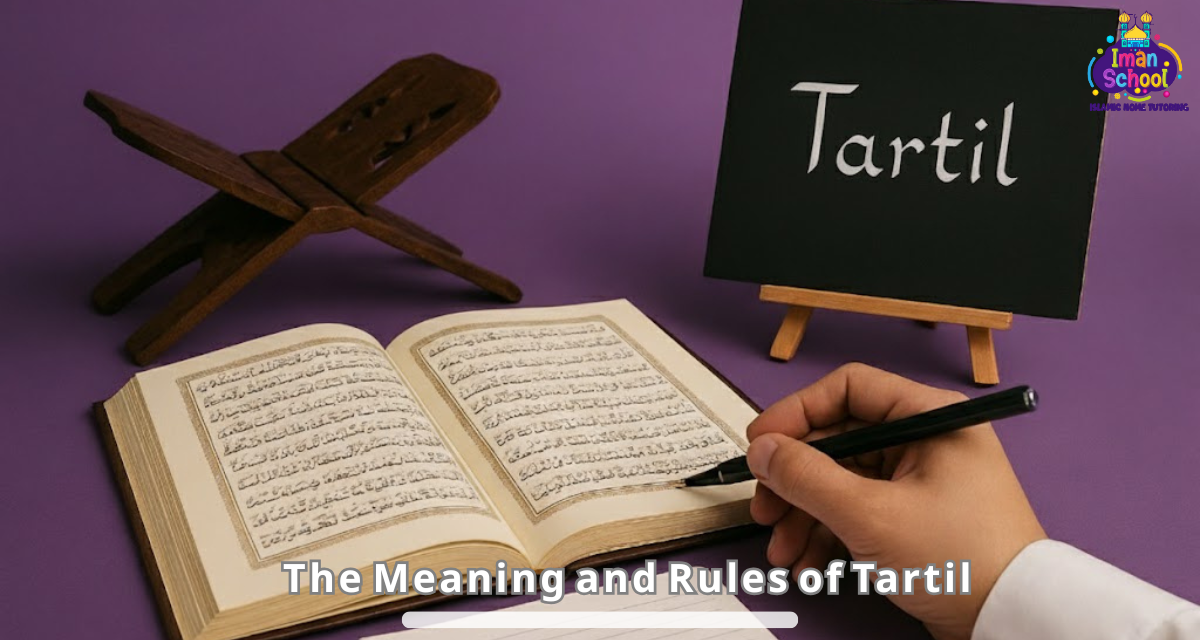Have you ever listened to a recitation of the Qur'an that seems to flow effortlessly, each word perfectly clear, inviting deep reflection? That quality is Tartil. For anyone seeking to connect more deeply with the Divine Word, understanding the Rules of Tartil is essential. But what exactly is Tartil Quran meaning, and how does it relate to the technical mastery of Tajweed? The essence of Tartil is not merely slow reading; it is a profound command from God to approach His Book with reverence, clarity, and reflection.
What is the Meaning and Rules of Tartil in Quran Recitation?
The term Tartil comes from the Arabic root r-t-l, meaning to recite distinctly, slowly, and in a well-arranged order.
-
Linguistically: It refers to precision, arrangement, and order.
-
Islamically/Technical Definition: Tartil is the balanced, measured pace of Quran recitation that combines the correct application of Tajweed rules with reflection (Tadabbur). It means pronouncing the letters and observing the stops (Waqf) and starts (Ibtidā’) correctly, while contemplating the Tartil Quran meaning.
Allah commanded the Prophet (PBUH):
"...And recite the Qur'an with [a measured, rhythmic] recitation (Tartil)." (Qur'an 73:4)
"... ورتل القرآن ترتيلاً."
(سورة المزمل، الآية 4)
The Essential Rules of Tartil (A Comprehensive Checklist)
To achieve Tartil, a reciter must adhere to the following comprehensive rules:
-
Correct Pronunciation (Makharij): Every letter must be articulated from its proper point of exit.
-
Qualities of Letters (Sifat): All letters must be given their inherent qualities (e.g., loudness, silence, heaviness, lightness).
-
Vowel and Consonant Lengths (Mudūd and Ghunnah): Observing the correct lengths for elongation (Madd) and nasalization (Ghunnah).
-
Stopping and Starting (Waqf wa Ibtidā’): Pausing at the correct places (Waqf) and resuming recitation at a meaningful point (Ibtidā’).
-
Pace (Rhythm): Maintaining a measured pace of Quran recitation that is neither too fast nor excessively slow.
-
Reflection (Tadabbur): Engaging the mind and heart to understand the message.

Is Tartil the Same as Tajweed? How do they differ?
This is a common question, as the Rules of Tartil are often used interchangeably with Tajweed. They are related but distinct:
|
Feature |
Tartil |
Tajweed |
|
Focus |
Manner and State of Recitation (Pace, Reflection, Order). |
Science and Rules (Mechanics of pronunciation, rules of Madd/Ghunnah). |
|
Scope |
Includes the correct Quran pronunciation and the spiritual/reflective quality. |
The technical application of Makharij and Sifat to make the letter perfect. |
|
Goal |
To understand and be affected by the word of God (Tadabbur). |
To ensure the letter is pronounced exactly as intended, avoiding major or minor errors. |
In short, Tartil vs Tajweed: Tajweed provides the how-to (the rules), while Tartil provides the quality and pace (the optimal method of delivery) that incorporates Tajweed. One cannot achieve Tartil without applying Tajweed.
Why did Allah Command us to Recite the Quran with Tartil?
The Divine Command to use Tartil translation (a measured, rhythmic recitation) is rooted in wisdom:
-
Facilitating Tadabbur: The primary reason is to allow the reciter and the listener to engage in what is Tadabbur in Quran (reflection and contemplation). A hurried recitation makes reflection impossible.
-
Awe and Reverence: The deliberate, slow recitation of Quran naturally instills respect and awe for the Divine source of the words.
-
Retention: Reciting with Tartil aids in memorization (Hifz) and makes it easier for a student to internalize the complex Tartil rules for beginners.
-
Correct Pronunciation: The steady pace ensures the reciter has time to fully articulate the Makharij and Sifat of every letter, ensuring the correct Quran pronunciation.
The Rules of Tartil: Is it Obligatory to use a Slow Pace?
The obligation is not strictly on the slowness of the pace, but on the correctness of the recitation.
The Rules of Tartil require a pace that allows for the perfect application of Tajweed and the spiritual presence of the heart. If one recites quickly but still fulfills all the rules of Madd, Ghunnah, and Makharij, then this is valid. However, the standard definition of how to recite Quran with Tartil implies a moderate to slow pace to maximize reflection.
How to Achieve Tartil: Essential Tips for Better Recitation and Reflection
Mastering the Meaning and Rules of Tartil requires conscious practice and spiritual presence. Here are 10 Tartil practice tips for students:
-
Prioritize Makharij Practice: Dedicate time specifically to mastering the correct Quran pronunciation of difficult letters.
-
Isolate the Rules: When starting your learn Tartil online journey, choose one Tajweed rule (e.g., Idgham) and apply it meticulously throughout your recitation.
-
Listen to Certified Qurrā': Emulate the Quran recitation styles of masters known for their clear, measured pace, which epitomizes Tartil.
-
Maintain Wuḍū' (Ablution): Perform Wuḍū' before recitation to enhance spiritual presence and focus.
-
Use a Clear Mushaf (Quran): Utilize a copy with clear markings for stops and starts.
-
Recite to a Teacher: The only way to correct errors is to have a certified teacher monitor your application of the Rules of Tartil.
-
Read the Translation: Before reciting, read the Tartil translation of the verses to engage your mind and facilitate what is Tadabbur in Quran.
-
Avoid Excessive Melody: Focus on the clarity and correctness of the letter, not the beauty of the tune.
-
Practice Standing: Sometimes, standing while reciting helps maintain focus and gives the chest/diaphragm better control over the breath.
-
Record Yourself: Self-critique by recording your recitation and comparing it to a master reciter's version.
The Three Modes of Recitation: Tartil vs. Hadr vs. Tadwir Explained Simply
The modes of Quran recitation define the speed or pace, all of which must strictly adhere to the fundamental rules of Tajweed.
Hadr
Definition: The fastest permissible speed of recitation.
Application: Primarily used by advanced students or those engaged in online Hifz course review who need to quickly revise large portions of the Qur'an, as long as the reciter does not compromise the Makharij and Sifat or any of the Tarteel rules for beginners.
Tadwir
Definition: The moderate or medium speed of recitation, falling between Hadr and Tartil.
Application: This is a commonly used speed for daily recitation and general reading. It allows for a good balance between speed and the ability to apply Tajweed while still offering a chance for what is Tadabbur in Quran.
Tartil
Definition: The slow, deliberate, and preferable speed.
Application: This is the speed commanded in the Qur'an and is ideal for deep reflection, teaching, and learning. It is the pace that maximizes the spiritual benefit of the recitation, making it the most perfect form of recitation.

How Do I Start Learning The Meaning and Rules of Tartil as a Beginner?
To effectively learn Tartil online, a beginner must start with the building blocks of correct Quran pronunciation.
-
Foundational Course: Begin with a Noorani Qaida course or an online Tajweed course specifically designed for non-Arabic speakers.
-
Find an Expert: Enroll in a structured program with an Ijazah-certified tutor who can guide your application of the Rules of Tartil.
-
Iman School is the ideal place to begin this journey. As a leading online Quran school, we offer comprehensive learn Tartil online programs, providing one-on-one instruction to ensure you master the Makharij and Sifat and perfectly fulfill the Divine command of Tartil.
What Happens if I Don't Apply The Meaning and Rules of Tartil in Salah?
The ruling on applying The Meaning and Rules of Tartil in Salah (prayer) is that observing the basic rules of Tajweed is necessary (Wajib).
-
Ignoring Basic Rules: If you omit a Madd (elongation) necessary for a word's meaning, or change the articulation of a letter (ح instead of ه), you may invalidate your Salah because you have changed the meaning of the words. This is called Laḥn Jalī (obvious mistake).
-
Ignoring Advanced Rules: Missing minor Tajweed rules (like perfect Ghunnah length) is Makrūh (disliked) but generally does not invalidate the Salah.
-
Tartil's Role: While the slower pace of Tartil is highly recommended to enhance Salah, the obligation is to simply recite accurately enough to maintain the correct meaning of the Qur'an.
FAQs: The Meaning and Rules of Tartil
Is applying the Rules of Tartil necessary (Wajib) in every Quran recitation?
Applying the rules of Tajweed (correct Makharij, Sifat, etc.) is considered obligatory (Wajib) by many scholars. Reciting at the slow pace associated with Tartil is highly recommended (Mustaḥabb) for contemplation, but not strictly obligatory in every instance.
Does Tartil require me to have a beautiful or melodic voice?
No. Tartil is about clarity and correctness, not melody. While the Prophet (PBUH) encouraged beautifying the voice for the Qur'an, the primary focus of the Rules of Tartil is the accurate representation of the letters and words.
How can I learn the Meaning and Rules of Tartil if I don't speak Arabic?
You can easily learn Tartil online through programs that offer online Tajweed course instruction in English. You first learn the Tartil rules for beginners phonetically and then use English translations to understand the meaning (Tadabbur).
What is the difference between Tahqiq and Tartil in the context of learning?
Tahqiq is the slowest mode of recitation, used almost exclusively for the purpose of intense teaching and practice to ensure students master every letter with maximum control. Tartil is the Tahqiq mode adapted for general reading and is the recommended, contemplative pace.
What mistakes in recitation prevent me from achieving Tartil?
Any mistake that violates a Tajweed rule, such as failing to apply the correct length of Madd, changing the quality of a letter (Makharij and Sifat), or rushing the pace so much that letters become unclear, will prevent you from achieving Tarteel.
Finding the Best Quran Reciters to Understand The Meaning and Rules of Tartil
To truly grasp The Meaning and Rules of Tartil, you need a certified guide. Iman School is your premier online Quran school, offering highly certified teachers who specialize in the optimal Quran recitation styles for learners in the West.
Explore our comprehensive Islamic courses:
-
Quran Memorization (Hifz) Courses
-
Recitation and Tartil Online Courses
-
Tajweed Online Courses
-
Islamic Sciences and Studies (Fiqh, Hadith, Aqeedah)
-
Islamic Ethics and Manners
-
Arabic Language Courses (Conversational, Fundamentals, Classical/Fuşḥā)




